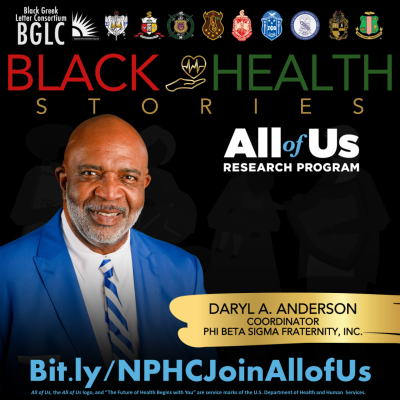Written by Daryl Anderson, Assistant Coordinator, Phi Beta Sigma Fraternity, Inc.
The Centers for Disease Control and Prevention (CDC) states that six out of every 10 Black Americans live with at least one chronic disease, like heart disease and stroke, cancer, or diabetes. These are some of the leading causes of death and disability in America. Research has shown that these underlying health conditions that when compounded with COVID-19 can be more lethal to Blacks.
That is where my story begins…
Most of my adult life I have lived with hypertension and being pre-diabetic. Medication has been used to control my symptoms and manage my overall health. Approximately one year after the COVID-19 information was released to the mainstream U.S. public, I was formally diagnosed with the illness. Because I am Black and predisposed to chronic illnesses, catching the COVID-19 virus was not the best scenario for me. I was bedridden for almost four weeks. Recovery was tough!
Six months prior to contracting COVID-19, I had completed an annual physical examination.
At that time, none of my existing health issues were extreme or causing me any significant concern or discomfort. However once diagnosed, things changed quickly and drastically. What was previously identified as a pre-diabetic condition suddenly became a highly severe onset of diabetes. My blood glucose level exceeded 600. That is nearly six times the average for a person without diabetes. Additionally, symptoms that would have previously been considered a mild case of congestion, for me became pneumonia. Sore muscles suddenly gave way to high inflammation of every joint in my body. I was in a battle, but I didn’t give up!
I was prescribed medication to combat the subsequent increase of physical health challenges and conditions. Medical advances that provided lifesaving treatments were made available through research and those that agreed to participate in tests and studies. Their efforts ultimately saved countless lives, including mine.
COVID-19 raised awareness regarding health disparities present in America. It also heightened questions surrounding chronic health illnesses prevalent in Black communities. Having COVID-19 taught me that although the virus doesn’t discriminate, its impact is seemingly influenced by social determinants of health, including race. I now realize that I need to focus on helping others who may not have access to the information, resources and opportunities that have been afforded to me through the All of Us Research Program. As a member of the Black Greek Letter Consortium (BGLC), I have the opportunity to serve and educate my community about the importance of minority participation in research and the possibilities of better health in the future.

